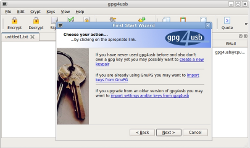FAQ
gpg4usb does not run from usb flash drive on linux
Current linux distributions don’t allow running from usb flash drive formmated with FAT
Gpg4usb does not start on 64bit linux
You need to install 32-bit compatibility libraries:
On debian based system these can be installed with
apt-get install ia32-libs
or (for newer Ubuntu distributions)
apt-get install ia32-libs-multiarch
On Suse these can be installed with
zypper install 32bit
On Red Hat distributions these can be installed with
yum install glibc.i686
How to backup all the key files
To backup all your key files, just backup the files keydb/pubring.gpg and keydb/secring.gpg
How to create a revocation key with gpg4usb
Unfortunately the creation of a revocation certificate is not implemented in the GUI of gpg4usb till now. But you can use the included gpg command line tool to create a revocation certificate. Just open a shell/command prompt, change with cd to the gpg4usb directory and follow these steps:
get your key id (for linux use ./bin/gpg instead):
./bin/gpg.exe --list-secret-keys --homedir=./keydb
create the revocation certificate (the revocation certificate will be contained in revoke.asc and myuid has to contain your keyid. Again use ./bin/gpg for linux):
./bin/gpg.exe --homedir=./keydb --output revoke.asc --gen-revoke myuid
How to change the passphrase of my private key
Unfortunately the change of the passphrase is not implemented in the GUI of gpg4usb till now. But you can use the included gpg command line tool to change the passphrase. Just open a shell/command prompt, change with cd to the gpg4usb directory and follow these steps:
get your key id (for linux use ./bin/gpg instead):
./bin/gpg.exe --list-secret-keys --homedir=./keydb
Reset the passphrase (myid contains the id of your key. Use ./bin/gpg for linux instead)
./bin/gpg.exe --homedir=./keydb --edit-key myid
gpg> passwd
Now just enter your old passphrase and your new one twice.

